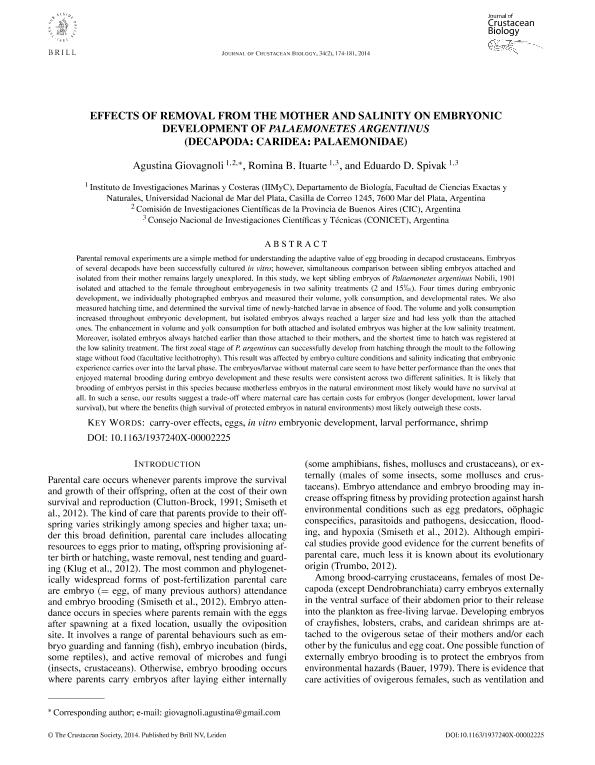Mostrar el registro sencillo del ítem
dc.contributor.author
Giovagnoli, Agustina

dc.contributor.author
Ituarte, Romina Belen

dc.contributor.author
Spivak, Eduardo Daniel

dc.date.available
2018-01-24T19:22:11Z
dc.date.issued
2014-01
dc.identifier.citation
Giovagnoli, Agustina; Ituarte, Romina Belen; Spivak, Eduardo Daniel; Effects of Removal from the Mother and Salinity on Embryonic Development of Palaemonetes Argentinus (Decapoda: Caridea: Palaemonidae); Crustacean Society; Journal of Crustacean Biology; 34; 2; 1-2014; 174-181
dc.identifier.issn
0278-0372
dc.identifier.uri
http://hdl.handle.net/11336/34448
dc.description.abstract
Parental removal experiments are a simple method for understanding the adaptive value of egg brooding in decapod crustaceans. Embryos of several decapods have been successfully cultured in vitro; however, simultaneous comparison between sibling embryos attached and isolated from their mother remains largely unexplored. In this study, we kept sibling embryos of Palaemonetes argentinusNobili, 1901 isolated and attached to the female throughout embryogenesis in two salinity treatments (2 and 15‰). Four times during embryonic development, we individually photographed embryos and measured their volume, yolk consumption, and developmental rates. We also measured hatching time, and determined the survival time of newly-hatched larvae in absence of food. The volume and yolk consumption increased throughout embryonic development, but isolated embryos always reached a larger size and had less yolk than the attached ones. The enhancement in volume and yolk consumption for both attached and isolated embryos was higher at the low salinity treatment. Moreover, isolated embryos always hatched earlier than those attached to their mothers, and the shortest time to hatch was registered at the low salinity treatment. The first zoeal stage of P. argentinus can successfully develop from hatching through the moult to the following stage without food (facultative lecithotrophy). This result was affected by embryo culture conditions and salinity indicating that embryonic experience carries over into the larval phase. The embryos/larvae without maternal care seem to have better performance than the ones that enjoyed maternal brooding during embryo development and these results were consistent across two different salinities. It is likely that brooding of embryos persist in this species because motherless embryos in the natural environment most likely would have no survival at all. In such a sense, our results suggest a trade-off where maternal care has certain costs for embryos (longer development, lower larval survival), but where the benefits (high survival of protected embryos in natural environments) most likely outweigh these costs.
dc.format
application/pdf
dc.language.iso
eng
dc.publisher
Crustacean Society

dc.rights
info:eu-repo/semantics/openAccess
dc.rights.uri
https://creativecommons.org/licenses/by-nc-sa/2.5/ar/
dc.subject
Carry-Over Effects
dc.subject
Eggs
dc.subject
In Vitroembryonic Development
dc.subject
Larval Performance
dc.subject
Shrimp
dc.subject.classification
Otras Ciencias Biológicas

dc.subject.classification
Ciencias Biológicas

dc.subject.classification
CIENCIAS NATURALES Y EXACTAS

dc.title
Effects of Removal from the Mother and Salinity on Embryonic Development of Palaemonetes Argentinus (Decapoda: Caridea: Palaemonidae)
dc.type
info:eu-repo/semantics/article
dc.type
info:ar-repo/semantics/artículo
dc.type
info:eu-repo/semantics/publishedVersion
dc.date.updated
2018-01-24T14:52:29Z
dc.journal.volume
34
dc.journal.number
2
dc.journal.pagination
174-181
dc.journal.pais
Estados Unidos

dc.journal.ciudad
Lawrence
dc.description.fil
Fil: Giovagnoli, Agustina. Consejo Nacional de Investigaciones Científicas y Técnicas. Centro Científico Tecnológico Conicet - Mar del Plata. Instituto de Investigaciones Marinas y Costeras. Universidad Nacional de Mar del Plata. Facultad de Ciencia Exactas y Naturales. Instituto de Investigaciones Marinas y Costeras; Argentina
dc.description.fil
Fil: Ituarte, Romina Belen. Consejo Nacional de Investigaciones Científicas y Técnicas. Centro Científico Tecnológico Conicet - Mar del Plata. Instituto de Investigaciones Marinas y Costeras. Universidad Nacional de Mar del Plata. Facultad de Ciencia Exactas y Naturales. Instituto de Investigaciones Marinas y Costeras; Argentina
dc.description.fil
Fil: Spivak, Eduardo Daniel. Consejo Nacional de Investigaciones Científicas y Técnicas. Centro Científico Tecnológico Conicet - Mar del Plata. Instituto de Investigaciones Marinas y Costeras. Universidad Nacional de Mar del Plata. Facultad de Ciencia Exactas y Naturales. Instituto de Investigaciones Marinas y Costeras; Argentina
dc.journal.title
Journal of Crustacean Biology

dc.relation.alternativeid
info:eu-repo/semantics/altIdentifier/doi/http://dx.doi.org/10.1163/1937240X-00002225
dc.relation.alternativeid
info:eu-repo/semantics/altIdentifier/url/https://academic.oup.com/jcb/article/34/2/174/2547919
Archivos asociados
